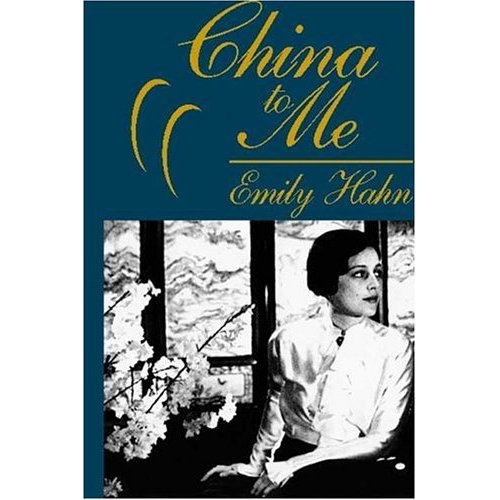China To Me by Emily Hahn (out of print in the United States)
Emily Hahn was brilliant, beautiful and shameless. Arriving in Shanghai in 1935, she rapidly scandalized the city's community of Westerners by taking up a Chinese lover, an addiction to opium and a gibbon named Mr. Mills, who was her constant escort. (She was once enraged by a dinner party invitation that ended with "Regret we cannot extend the invitation to Mr. Mills.") Later, when Emily announced that she and Charles Boxer, a married British army officer, were going to have a child, an American dowager's huffy response was, "Some women will stop at nothing to bring discredit to our nation."
Although her personal life makes dazzling reading, if that were all there was to Emily Hahn, it would be easy to dismiss her as a precursor to Bridget Jones. Emily, however, was no literary bimbo. She was a talented and professional writer who meticulously reported what she saw and how she lived in China before and during World War II.
Chosen by the Soong sisters to be their official biographer, Emily followed them to Chungking, where Japanese planes rained bombs upon Chiang Kai-shek's government and where Madame Chiang poured her legendary energy into making marmalade. Watching the bombing of the British Embassy while picnicking in the neighboring hills, Emily gives a vividly detailed description of the visual spectacle while confessing, "Sometimes it was too much for our nerves."
When World War II began and Japanese troops seized Hong Kong, Emily was there, with her newborn daughter whose father was now a wounded prisoner of war. It was a time during which she resisted the melodrama that could well have taken over her life. Death, starvation, looting and rape are all in the backdrop of Emily’s story, while never being allowed center stage. As she manages to find food for her baby and for Charles, as she makes her way through the Japanese bureaucracy in a successful attempt to stay out of an internment camp, as she learns how to maneuver in a black market economy, Emily tells her story in the calm, dispassionate tones of a woman who had no energy to spare for flamboyant emotional displays.
Explaining why gold and diamonds are the key to wartime survival, or the stark terror felt after waking up after a night of serious drinking to discover that while in her cups she had slapped the Japanese chief of Foreign Affairs, or the shame of listening to American propaganda broadcasts that extolled the success of bombing raids on Hong Kong which had in truth accomplished nothing at all, Emily gives a clear and rarely seen picture of war, the one that is shared by the noncombatants who struggle to survive.
Emily rather unfairly dismissed China To Me as an "egotistical history" but generations of readers have given it the status of a classic. As resilient as Ms. Hahn herself, this book has bounced in and out of print since it was first published in 1946, and waits now in used bookstores across the world to be rediscovered one more time.~Janet Brown
